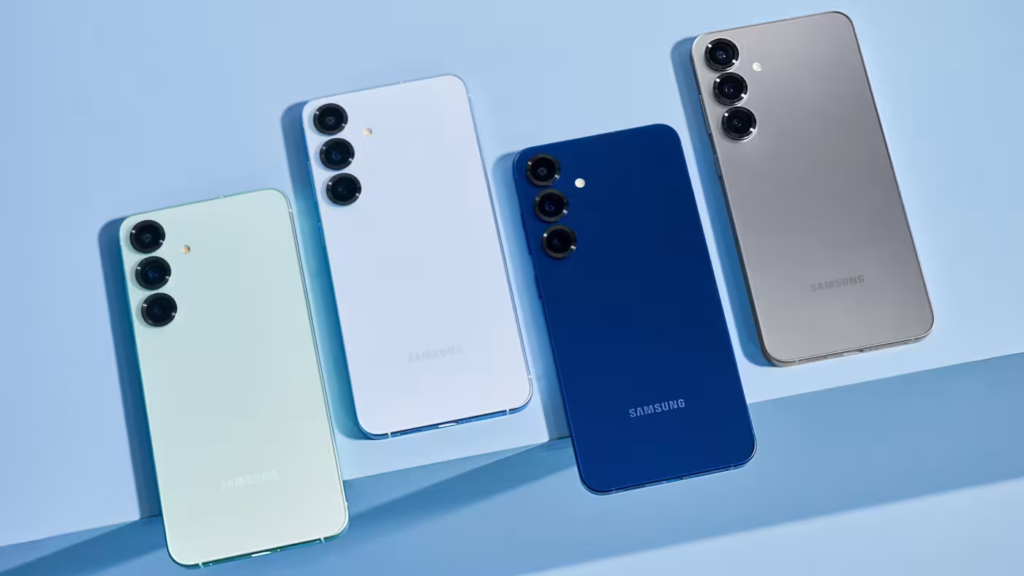Samsung is doubling down on its efforts to capture a larger share of the U.S. smartphone market, unveiling the AI-driven Galaxy S25 at its annual “Unpacked” event in San Jose, California. The South Korean tech giant hopes the new model, powered by Google’s Gemini AI and Qualcomm chips, will help it compete more aggressively against Apple, which continues to lead U.S. smartphone sales.
AI at the Core of the S25
The Galaxy S25 boasts a next-generation AI operating system designed to transform how users interact with their devices. TM Roh, president of Samsung’s mobile division, emphasized the collaborative effort with Google, stating that the AI ecosystem developed with Google is strategically positioned in the U.S. market.
Samsung’s S25 introduces advanced AI capabilities, including faster responses to voice and text commands, tailored personalization using locally stored data, and seamless integration with third-party apps like WhatsApp and Spotify. By utilizing Qualcomm’s Snapdragon 8 Elite chips across all three S25 models, the device achieves a 40% boost in neural processor performance, positioning it as a cutting-edge option for AI-driven mobile experiences.
A Critical Launch Amid Industry Challenges
The unveiling comes as global smartphone sales remain flat and Samsung faces mounting pressure. Apple continues to dominate the U.S. market with a 53% share, compared to Samsung’s 23%, according to Counterpoint Research. Meanwhile, Samsung’s semiconductor division has been plagued by setbacks, leading to a rare apology from the company in October after its stock price dropped 30% over six months.
Samsung’s reliance on Qualcomm processors for the S25, rather than its own Exynos chips, underscores challenges within its chip division, which contributes 60% of the company’s operating profit. Additionally, Chinese manufacturers are gaining ground in the burgeoning foldable phone market, further intensifying competition.
AI Arms Race with Apple
Both Samsung and Apple are betting heavily on generative AI to invigorate consumer interest in smartphones. Samsung launched its first AI-enabled smartphone, the Galaxy S24, in early 2024, while Apple introduced its Apple Intelligence features, powered by OpenAI’s ChatGPT, later that year.
The S25’s AI assistant, built on Google’s Gemini, supports 46 languages, far outpacing Apple Intelligence, which currently operates only in select English variants. Analysts see this as a significant advantage for Samsung’s global reach. However, consumer adoption of AI features remains uncertain. A December survey by SellCell found that many users of AI-enabled smartphones from both brands saw little added value in the initial AI capabilities.
Can AI Disrupt the Smartphone Status Quo?
Analysts remain cautious about whether AI will revolutionize the smartphone industry. While Samsung enjoys a first-mover advantage in integrating generative AI capabilities across its devices, broader consumer awareness and demand for these features are still evolving.
Canalys, a technology analysis firm, noted that increased consumer interest in AI presents an opportunity for Samsung, especially given its global availability and early adoption. Yet, the road ahead remains uncertain as competitors like Apple and emerging Chinese brands continue to innovate in both AI and hardware design.
Samsung is betting that the Galaxy S25, with its AI-focused features and improved hardware, will usher in a new era of smartphone interaction—moving beyond touchscreens to devices driven by intelligent, voice-powered assistants. Whether this gamble pays off will depend on how quickly consumers embrace these innovations and whether Samsung can maintain its technological edge in a highly competitive market.

